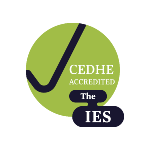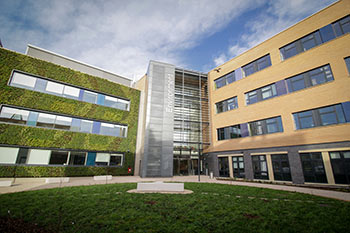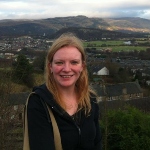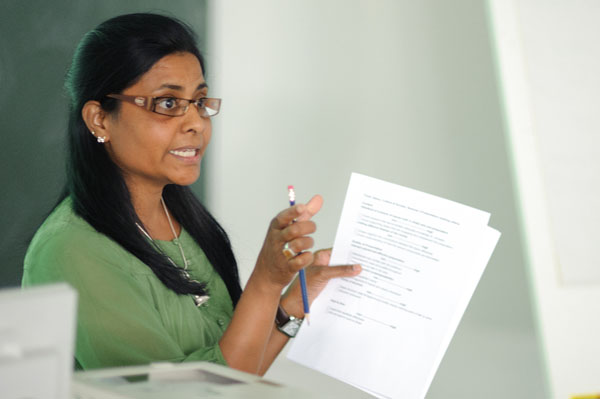View semester dates

MEnv (Hons) Environmental Science (with a placement year)
Understand and manage human impacts on the environment using a multidisciplinary approach.
Year of entry: 2026/27
View semester dates
Learn how the earth operates and reacts to human actions.
You'll study the broader social, political and economic aspects of managing the environment. This will help you to manage the environment for long-term sustainability. You'll gain expertise to tackle environmental issues. These include climate change, air pollution, and shifts in energy usage.
Accreditation

Accredited by the Institution of Environmental Sciences.

At York, we believe in learning by doing. Our field trips are a great way to better understand what we read and discuss in our lectures and seminars every day.
Course content
You'll build a strong foundation of knowledge in the physical sciences. This will provide you with skills you need to make informed judgements about environmental issues.
Year 1
The first year modules give you an introduction to the fundamentals of environmental science, providing you with a foundation for more advanced material in the following years.
Core modules
- Environmental Chemistry
- Environment, Development and Society
- Ecological Principles
- Introduction to Global Challenges
- Introduction to Research Skills
- Earth: Past, Present and Future
Academic integrity module
In addition to the above you will also need to complete our online Academic Integrity module.
Year 2
You'll take a range of core modules to develop your knowledge of environmental science. You can then begin to tailor your degree to your own interests with a choice of option modules.
Core modules
Option modules
You will study two option modules. Examples can be found below. Some option module combinations may not be possible. The options available to you will be confirmed after you begin your course.
Year 3
You have the option to pursue a placement year in Year 3 or Year 4 of your integrated Masters, extending your time at York by one year. Whilst you are on placement you'll retain your student status and receive your placement year within your degree title.
It's your responsibility to find and secure your work placement but you'll be supported throughout the process by a dedicated member of staff.
Your placement must be between 9 and 12 months and start during the summer vacation. You can choose to do a placement of 9 or 12 months or two shorter placements that total 9 or 12 months of experience.
You will be assigned a Placement Supervisor for the duration of your placement who will keep in touch with you throughout your placement and undertake supervision meetings with you.
The placement year is an assessed, pass/fail module that is added to your existing programme of study. The assessment is in the form of a 3000 word reflective report with supporting reflective blogs, it is assessed by Careers and Placements.
Placements can be found throughout industry and you're encouraged to focus on your desired outcomes for the placement year in considering the industry in which you would like to secure a placement.
All placements will be subject to the University placement approval process and must meet the Placement Criteria.
Year 4
In Year 4 you undertake advanced research training to prepare the way to your fourth year of masters study. You can also select option modules to suit your interests and employment objectives.
Core modules
Option modules
You will study two option modules. Examples can be found below. Some option module combinations may not be possible. The options available to you will be confirmed after you begin your course.
Year 5
In Year 5 you undertake further advanced training, vocational modules and a significant independent research project tailored to your research interests and career ambitions.
Core modules:
Option modules
You will study two option modules. Examples can be found below. Some option module combinations may not be possible. The options available to you will be confirmed after you begin your course.
Our modules may change to reflect the latest academic thinking and expertise of our staff, and in line with Department/School academic planning.
Learning outcomes
Every course at York has been designed to provide clear and ambitious learning outcomes. These learning outcomes give you an understanding of what you will be able to do at the end of the course. We develop each course by designing modules that grow your abilities towards the learning outcomes and help you to explain what you can offer to employers. Find out more about our approach to teaching and learning.
Learning outcomes for this course
- Debate, interpret and explain current and emerging issues in environmental science occurring on a range of scales using appropriate methods and norms, and engage critically with best evidence on the impacts and management of climate, environmental and land use change, pollution and development [Knowledgeable and Aware]
- Obtain, synthesise and critically evaluate information from a wide range of reliable sources, and collate this information to establish current understanding and independently identify key research questions in specialised areas of environmental science[Independent learner]
- Cut across disciplinary boundaries to link knowledge and experience from a wide range of natural, physical and social sciences, to understand the complex interactions occurring within and between natural and human environments, and the management and business sector [Interdisciplinary thinker]
- Identify knowledge gaps, plan, design and execute advanced research as an individual or as part of a team to address environmental questions and problems using critically-selected field, survey and laboratory methods at appropriate temporal and spatial scales [Creator of new knowledge]
- Design and undertake critical analyses of qualitative and quantitative data using appropriate scientific and technological information and tools such as GIS and statistical packages to draw meaningful conclusions from research in the field of environmental science [Analytical]
- Effectively communicate knowledge, complex ideas and persuasive arguments to professional and non-specialist audiences using verbal, written, visual and digital media and research publications [Effective communicator]
- Recommend sustainable solutions to environmental problems that consider the broader social, political and environmental contexts, and the ethical implications of their application by applying knowledge, theories and approaches from environmental science and related disciplines [Problem solver]
- Work responsibly as part of a team or as a team-leader, including in an applied setting, to set challenging yet attainable goals and make an important contribution to defining the way in which our environment functions, understanding how it will respond to human activities and developing sustainable solutions [Team player]
Fees and funding
The fees and funding information here is for students starting in the 2026/27 academic year.
If you take a year abroad or year in industry you'll pay a reduced rate of fees for that year.
Annual tuition fees
| UK (home) | International and EU |
|---|---|
| £9,535 (TBC) | £32,350 |
The UK government has announced its intention to increase tuition fees from £9,535 to £9,790 for the 2026/27 academic year. We expect this to apply to new UK (home) undergraduate students starting their studies in September 2026.
UK (home) or international fees?
The level of fee that you will be asked to pay depends on whether you're classed as a UK (home) or international student. Check your fee status.
Fees for subsequent years
- UK (home) fees may increase within the government fee cap in subsequent academic years. We will notify you of any increase as soon as we can.
- International fees are subject to increase in subsequent years in line with the prevailing Consumer Price Index (CPI) inflation rate (up to a maximum of 10%).
More information
For more information about tuition fees, any reduced fees for study abroad and work placement years, scholarships, tuition fee loans, maintenance loans and living costs see undergraduate fees and funding.
Additional costs
Field work is integral to your course and includes both residential and day trips. In year 1 and 2 there are core residential and day field trips. The travel and accommodation costs of these core trips are included in your student fees. Optional field trips are not paid for, and you will be asked to contribute to the cost of these. The destinations of our residential field trips do undergo change to meet the requirements of our students, acknowledge the pressing environmental challenges we face and meet our commitment to sustainability and inclusivity.
Funding
We'll confirm more funding opportunities for students joining us in 2026/27 throughout the year.
York, Oxford, Cambridge, Imperial
Just four UK universities are rated Gold for teaching and top ten for research* in the latest national assessment exercises.
* Awarded joint 10th in the Times Higher Education ranking of the Research Excellence Framework 2021.
Teaching and assessment
You’ll study and learn with academics who are active researchers, experts in their field and have a passion for their subjects. Our approach to teaching will provide you with the knowledge, opportunities, and support you need to grow and succeed in a global workplace. Find out more about our approach to teaching and learning.
Teaching format
You'll be taught through a combination of field-based learning, research-led teaching and a more traditional combination of lectures, tutorials, and seminars. Practical work is a key feature, both in individual projects and in groups.
Field work is integral to your course and includes both residential and day trips. In year 1 and 2 there are core residential and day field trips. The destinations of our residential field trips do change to meet the requirements of our students, acknowledge the pressing environmental challenges we face and meet our commitment to sustainability and inclusivity.
For the Placement Year, a dedicated member of staff will guide you through the process of finding a placement. You will be assigned a supervisor for your placement and be expected to contribute academic work based on your experience. Placements can be local, national or international.
Timetabled activities
In your first year, you can expect:
| Lectures | 4-6 hours per week |
|---|---|
| Seminars | 1-2 hours per week |
| Workshops | 2-4 hours per week |
| Practicals | 2-4 hours per week |
| Field trips | 1 week |
These figures are representative of a typical week. Your contact hours will vary throughout the year due to your module choices, non-compulsory classes, exam periods and changes to scheduled activities.
Outside your timetabled hours, you'll study independently. This may include preparation for classes, follow-up work, wider reading, practice completion of assessment tasks, or revision.
In the UK, full-time students are expected to spend 1,200 hours a year learning. That's about 40 hours of classes and independent study each week during semesters. Everyone learns at a different rate, so the number of hours you spend on independent study will be different to other students on your course.
Facilities

Our bespoke building contains purpose-built labs, lecture theatres and seminar rooms.
Teaching location
You will be based in the Department of Environment and Geography, which is based on Campus West.
About our campus
Our beautiful green campus offers a student-friendly setting in which to live and study, within easy reach of the action in the city centre. It's easy to get around - everything is within walking or pedalling distance, or you can use the fast and frequent bus service. Take a campus tour.
Assessment and feedback
Each module will be assessed either by coursework, closed or open examination or a combination of both; where possible these will be practical and solutions-based assessments. Coursework can include:
- podcasts
- policy briefings
- practical write-ups
- reports
- reflective Exercises
- oral presentations
- portfolios
- essays
In your final year, you'll complete an independent research project based on your interests and career aspirations.
Careers and skills
The BSc in Environmental Science will equip you with practical, applied skills for both environment-related employment and more general career opportunities. The department has a track record of providing a springboard to a wide range of careers and postgraduate research. Find out more about careers and employability.
Career opportunities
- Environmental conservationist
- Graduate policy analyst
- Flood risk officer
- Graduate environmental consultant
- Environmental engineer
- Oil and gas analyst
Example employers
- Network Rail
- Environment Agency
- Anglian Water
- Atkins
- Department for International Development
- WSP│Parsons Brinckerhoff Consultancy
- Defra
Transferable skills
- Project management
- Feasibility studies
- Data analysis
- Research skills
- Time management
Having a supervisor at York was invaluable. The pastoral care that the University offers helps with applications and interview skills. York also allows you to be independent and work at your own pace, which really helps when you start doing your own projects in a work environment.
Entry requirements
| Qualification | Typical offer |
|---|---|
| A levels | ABB including two of the following science subjects: Biology, Chemistry, Geography, Geology, Environmental Studies, Mathematics, Physics, Psychology or Life and Health Sciences |
| Access to Higher Education Diploma | 30 credits at Distinction and 15 credits at Merit or higher including Science-related units. |
| BTEC National Extended Diploma | DDM. Please contact us at ug-admissions@york.ac.uk for details on whether your BTEC will be considered for entry. |
| European Baccalaureate | 75% overall including two of the following science subjects: Biology, Chemistry, Geography, Geology, Environmental Studies, Mathematics, Physics, Psychology or Life and Health Sciences |
| International Baccalaureate | 34 points including two of the following science subjects at Higher Level: Biology, Chemistry, Geography, Geology, Mathematics (either Analysis and Approaches or Applications and Interpretations), Physics, Psychology or Life and Health Sciences |
| T levels | Distinction overall in following T Level subjects: Science |
| Scottish Highers / Advanced Highers | Advanced Highers - BB in two of the following Science subjects: Biology, Chemistry, Environmental Studies, Geography, Geology, Life and Health Sciences, Mathematics, Physics or Psychology plus Scottish Highers - BC We may also be able to consider three Advanced Highers or a combination of Highers and Advanced Highers, where an applicant does not meet the grade requirement through Highers alone. Please contact us to discuss your qualifications. |
| International foundation programme | Foundation Certificate from our International Pathway College or an appropriate alternative. |
| Other international qualifications | Equivalent qualifications from your country |
Additional requirements
You should also have GCSE Mathematics at grade 4 (C) or above, or equivalent.
Alternative offers
Meeting the following additional criteria may qualify you for an alternative offer.
| Criteria | Adjustment |
|---|---|
| Widening participation | BBC including B in two of the following science subjects: Biology, Chemistry, Geography, Geology, Environmental Studies, Mathematics, Physics, Psychology or Life and Health Sciences This is conditional upon successful completion of the WP programme including the YorJourney module (Black Access Programme, Next Step York) or successful completion of Realising Opportunities More about widening participation. |
| Contextual offer | BBB including two of the following science subjects: Biology, Chemistry, Geography, Geology, Environmental Studies, Mathematics, Physics, Psychology or Life and Health Sciences |
| EPQ | If you achieve C or higher in the EPQ, you may be eligible for an alternative offer up to one A level grade (or equivalent) below our typical offer. |
| Core Maths | If you achieve B or higher in Core Maths, you may be eligible for an alternative offer up to one A level grade (or equivalent) below our typical offer. |
| MOOCs | If you successfully complete our online course Tackling environmental challenges for a sustainable future, you may be eligible for an alternative offer up to one A level grade (or equivalent) below our typical offer. Details about how to evidence completion of the MOOC will be sent in your offer letter. Please note: you do not need to pay for the certificate. More about MOOCs. |
English language
If English isn't your first language you may need to provide evidence of your English language ability. We accept the following qualifications:
| Qualification | Minimum requirement |
|---|---|
| IELTS (Academic) | 6.5, with a minimum of 6.0 in each component |
| IB English | A score of 4 in English A or 5 in English B (Higher Level or Standard Level) |
| Cambridge CEFR | 176, with a minimum of 169 in each component |
| Oxford ELLT | 7, with a minimum of 6 in each component |
| Oxford Test of English Advanced | 136, with a minimum of 126 in each component |
| Duolingo | Integrated subscores: 120 overall, with a minimum of 105 in each component |
| GCSE/IGCSE/O level English Language (as a first or second language) | Grade C / Grade 4 |
| LanguageCert SELT | B2 with a minimum score of 33/50 in each component |
| LanguageCert Academic | B2 with a minimum score of 33/50 in each component |
| Kaplan Test of English Language | 478 Main Flight score with 444 in each component |
| Skills for English | B2: Merit overall, with Pass with Merit in each component |
| PTE Academic | 61, with a minimum of 55 in each component |
| TOEFL | 87 overall, with a minimum of 21 in each component (taken before January 2026) 4.5 with 5 in Listening and 4.5 in each other component (taken after January 2026) |
| Trinity ISE III | Merit in all components |
| Other English language qualifications | We also accept other English Language qualifications, including various school-leaving certificates. |
For more information see our undergraduate English language requirements.
If you haven't met our English language requirements
You may be eligible for one of our pre-sessional English language courses. These courses will provide you with the level of English needed to meet the conditions of your offer.
The length of course you need to take depends on your current English language test scores and how much you need to improve to reach our English language requirements.
After you've accepted your offer to study at York, we'll confirm which pre-sessional course you should apply to via You@York.
Next steps
Contact us
Get in touch if you have any questions

Discover York








